Zolt Kovac
[email protected]
Stupid Paintings
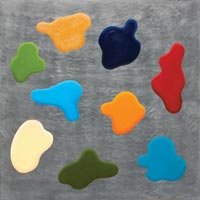

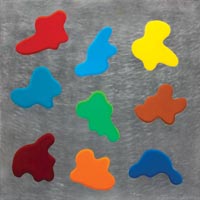

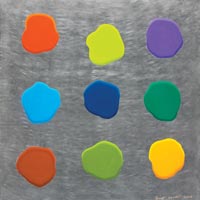

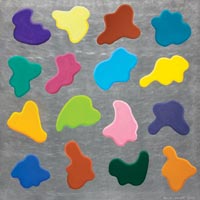
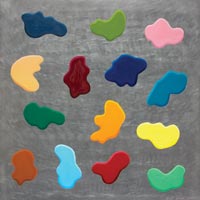
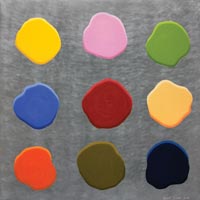
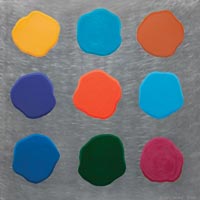
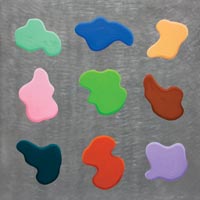
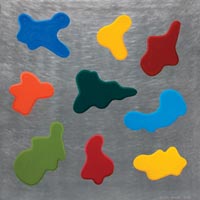
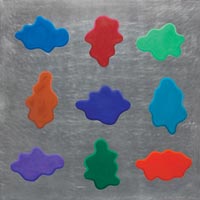
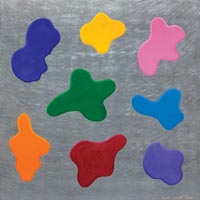
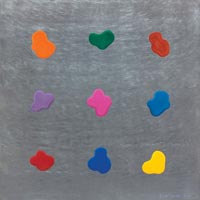
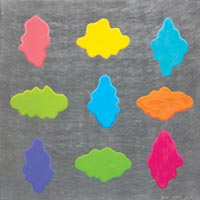
Zolt Kovac |
| back |
Stupid Paintings |
    |
    |
    |
    |
Let’s Talk about Art, Let Talk Stupid Transcript of a part of the conversation held between Boris Mladenović and Žolt Kovač in Žolt’s studio in August 2009. Žolt: Sometimes I try to do it by putting the forms and colors one next to the other in the most banal way. And I try, sometimes, to simply come up with the most stupid combination of colors. So it would turn out to be unexpected ... But not to surprise. There should be no surprise. To choose a color which least matches another one. Boris: Maybe not to use the one that matches the least, that would be more ugly than stupid ... Ž: That’s right, that color must be neutral in regards to another one. Not to match, but to provoke. B. The least convincing one ... Ž: Yes. Most neutral in regards to the other color ...(pause). However, it changes ... You know, I just can’t paint loads of paintings with the same emotion. I paint two or there of them. Then I change something. I change the form, or ... I think it would be even more stupid to somehow have those two colors match. It’s a kind of banal approach to stupidity, but sometimes I think that even greater stupidity could be found in it. B: So you explore stupidity? Ž: Yes. I’m a stupidity explorer. B: Yes ... (laughter) you try out to see what is stupider, kitsch or a nonsensical combination of colors, what is really stupid ... Ž: Something like that ... then at some point I start believing that those combinations of colors are really stupid .. some of the pastels ones ... Then sometimes I get the feeling that the forms are the ones that are stupid. So I make them look somewhat three dimensional ... that seems to be even stupider, more modern ... Then I make circles which are almost circles... I find circles which are almost circles interesting. As metaphors. A circle is considered to be perfect. However, it exists only as an abstract term. There is no perfect circle in nature ... nor a perfect ball. B: I saw a TV program once where they used some precise instruments to measure how round a billiard ball is. And it didn’t turn out to be so round ... but as far as our daily perception is concerned it’s very round indeed. Ž: They messed up something on the Hubble space telescope, they didn’t polish a supersonic lens well enough and then they launched the satellite. So they had to send a team up there to do some more polish ... B: That sounds very stupid. (laughter). Ž: (laughter) ..., yes, it is. NASA, billions of dollars, and what you get at the end is something that is not a perfect circle. I find that interesting, I paint those almost circles in such a way that you can clearly see that they are not perfect. B: An almost circle is a circle that is a measure of man. You can see a circle in it, there could be one, but you can immediately see that’s not the case. Ž: That’s right. An almost circle will never be a circle ... (pause) ... then it occurs to me that those almost circles in those colorful colors are stupid ... B: Your exploration of stupidity is an on going process. What we see now is a cross section of the exploration you have done so far. Ž: That’s it. It is elusive. How do you make a stupid picture? And simultaneously one of high quality. B: It’s the same as pronouncing boredom to be quality time. Ž: That’s the point. Boredom is well spent time, quality time. I’m not talking about the time when we are bored. I’m talking about genuine, long lasting boredom. Time that is devoid of obligations, impressions, needs, empty time ... The time when we are reduced to ourselves, where man’s only activity is bare existence. B: You are making an interesting point. Specially if we make note of the fact that boredom is anathemized. Somewhat rehabilitated in the book Philosophy of Boredom. It turns out that the control of boredom is an important segment of mass control. People are forcibly dragged away from boredom by being constantly bombarded by information ... Ž: Yes. And stupidity is the material of boredom, it gives quality to the time spent being bored. B: Obviously there’s a strong connection between the stupid and the boring ... Ž: Maybe idleness is a better word than boredom. That word hurts less ... By exposing oneself to such services which provide us with surplus information, such as television for example, we kill time. Surrendering to idleness we empty time. That time becomes important ... stupid and important. B: Thus, you consider stupidity and boredom to be two contemplative states of modern man. Ž: Yes, I think so. If we have to define it, that would be a pretty precise definition ... B: Both of these states affirm man. Contrary to killing time which invalidates him. Killing time is supported by the system. The system kills the time that belongs to us. Ž: Yes, it does and it’s seductive. When a lifestyle magazine encourages its readers to devote time to themselves it refers to the cosmetic adverts on the next page. It’s a fraud. Time for oneself is stupid and boring. B: But stupidity has been anathmized even more than boredom. There’s a built in social fear of stupidity in the civilized world. You know the sayings: “Shut up, you stupid”, or “you behaved stupidly” ... Ž: In that case stupidity is connected with a kind of judgment made on the state of someone’s intelligence or how much a person is accepted and interesting in a social situations. The term stupidity is abused because it boils down to whether the person has some information which is often surplus or just not true and whose function is only to maintain the standards and norms of a social group or society on the whole. The more important part is what society that prescribes these norms is like. Since it’s also a means for controlling and directing an individual by society. Stupidity is abused as a measure of things while stupidity is actually a state. A state that has no qualifier, it’s neither positive or negative, only something which has a quality. As you said ... a contemplative state. B: Yes. If an almost circle is thus a circle for the measure of man then stupidity is metaphysics for the measure of modern man. Ž: Yes ...You want to define things all the time ... OK, that’s it, we can put it that way ... B: Alright, ... we can go on like this for days, we can go on saying stupid things ... it wouldn’t be bad if we do conclude some things ...
|